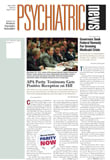The 94th Annual Meeting of the National Governors Association (NGA) last month was dominated by concerns about fiscal issues—most specifically, Medicaid.
Outgoing NGA Chair John Engler (R-Mich.) said in a press statement, “For the past year, the governors have been in the unfamiliar territory of declining tax revenues, spiraling health care costs, and a slowing economy.”
In the same statement, he laid out the issues that dominated the agenda for the meeting: increasing the federal share of Medicaid costs, improving access to prescription drugs, welfare reform, and homeland security.
The July 15 New York Times reported that 45 states claimed revenue shortfalls over the last year totaling $50 billion, caused by a drop in sales, capital gains, and corporate and personal income taxes.
According to NGA background materials, Medicaid comprises an average of 20 percent of state spending. Costs of the program have grown in both absolute and relative terms in recent years. As a result, Medicaid is the second-largest expenditure in most state budgets.
Medicaid is the largest public source of funds for mental health services.
The New York Times also reported that “the most aggravating problem” with Medicaid is that increasing numbers of dually eligible people are moving from Medicare to Medicaid, effectively transferring more costs to the states.
About 7 million seniors are considered dually eligible, and their health expenses account for 35 percent of the cost of Medicaid.
The NGA has proposed measures to provide federal fiscal relief for states in terms of Medicaid.
The first proposal has three components: a temporary increase in states’ Federal Medical Assistance Percentage (FMAP), flexible health and social services grants allocated on the basis of states’ shares of Medicaid FMAP, and funding for a one-year “hold-harmless” provision for states that experienced a reduction in FMAP for federal Fiscal 2002.
The governors also proposed an increase in the rebates that states receive from pharmaceutical companies that participate in the Medicaid program by changing the pricing mechanism for determining the size of the mandated rebate.
According to NGA, U.S. Sens. Ben Nelson (D-Neb.) and Susan Collins (R-Maine) have agreed to support the NGA fiscal relief strategy and have introduced legislation that would provide a combination of a temporary increase in the Medicaid FMAP, a temporary and flexible block grant, and a hold-harmless provision so that states would not see their FMAPs reduced. At press time S 2570 had 14 cosponsors.
The bill would give the states $8.9 billion over the next 18 months.
According to the July 14 Washington Post, the Bush administration does not support the legislation.
Jay Cutler, J.D., director of APA’s Division of Government Relations, told Psychiatric News, “APA is very concerned about the strains facing most state Medicaid budgets. We have received reports from states, such as Maryland and Virginia, that such basic treatment needs as physician visits and medications are jeopardized by budget shortfalls. We fully support an increase in the FMAP.”
APA President Paul Appelbaum told Psychiatric News, “With states increasingly looking to Medicaid to fund care for people with serious mental illness, cuts in Medicaid funding are more threatening than ever to the well-being of the people we treat. Moreover, the same budget crunch that’s affecting Medicaid is leading states to reduce services provided directly by their departments of mental health. Unless Congress provides support, as by increasing the FMAP, this one-two punch could be devastating to many people with mental illness.”
More information about the NGA’s annual meeting is posted on the NGA Web site at www.nga.org/nga/legislativeUpdate/1,1169,C_ISSUE_BRIEF^D_4092,00.html. ▪
